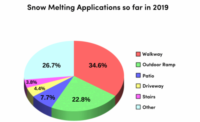Web Exclusive: WSI Calls For Colder-Than-Normal Temperatures In East, South And Central U.S.
On the other side of the country, warmer-than-normal temperatures are expected in the west coast states and northern plains in cities like Seattle, Portland, San Francisco, Sacramento, Los Angeles, Billings, Bismarck, and Minneapolis.
WSI successfully predicted (1) a hot 2002 summer season, (2) a cold October 2002 across the northern United States, and (3) a cold November 2002 across the eastern half of the United States. Their three-month seasonal forecasts have been skillful for 8 out of the last 12 periods. A skillful seasonal forecast is defined as one that is closer to what is actually observed than a forecast using the 10-year average temperature.
WSI's Energycast seasonal forecasts are now being issued using the trailing 10-year (1992-2001) average temperature as "normal." This reflects the sentiment in the trading industry that the last 10 years are a better guide of future weather than the US government standard 30-year fixed (1971-2000) averages.
WSI, which provides customized weather information to energy traders, issues its Seasonal Weather Advisories twice monthly. The first is made available to WSI subscribers two days before the Climate Prediction Center (CPC) issues its seasonal forecasts. The second is sent to customers toward the end of the month. The next WSI seasonal forecast, which will cover the period January-March, will be issued on December 17th.
Looking for a reprint of this article?
From high-res PDFs to custom plaques, order your copy today!





